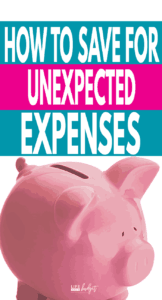
Just how unexpected are unexpected expenses, exactly?
I question this entire idea of unexpected costs because it really doesn’t make sense if you apply some logic to it. Life throws curve balls and this is something we all are aware of. Wouldn’t it be wise to prepare for these events?
According to recent survey results, 62 percent of Americans have less than $1,000 in savings. So even though we know things will pop-up, we still fail to prepare for them. Then we want to label them as unexpected expenses and lament on how they keep us from getting ahead. Let’s stop that.
Today I want to discuss these inconveniences and help anyone who constantly battles with this lie to come up with solutions that will protect their financial well-being from the so-called unexpected.
Types of Unexpected Expenses
To get an idea of what you need to save for, we need to determine what some of these unexpected things are that catches us off guard and throw our finances in disarray. Here are a few:
- Kid field trips
- Car repairs
- Sick visits/ Emergency Room Visits
- Travel expenses due to death of a loved one
- Parking/Speeding tickets
- Work social contributions aka “the kitty fund”
- Middle of the school year school supplies
- Surgery
- Broken phone or computer
- Home maintenance (appliance, electrical, plumbing, air, heat failure etc)
- Flood, tornado, storm damage
- Car accidents
- Unpaid sick day
- Baby shower or housewarming gifts
- Higher than normal heat bill
- Club or membership dues
Some of these are truly unexpected. I mean, if you were going thirty over the speed limit to get to work last week, that speeding ticket which accompanied your heavy foot probably caught you a little off guard. Stuff happens, right?
Or when your baby drools all over your phone (true story) that was already hanging on by a thread and you had to replace it asap? I knew my phone needed replacement and I was saving for it. However, I wasn’t able to anticipate the little one’s deviant behavior that hastened my need for a replacement.
I get it. Things catch you off guard, but there is no doubt about it, a speeding ticket and knowing you need a new phone are not unexpected. They are things we should prepare for. Let’s say a storm came through and destroyed half of your roof. We know mother nature is unpredictable so we should prepare by saving enough to at least cover the deductible for your home insurance. That’s a responsibility that comes with home ownership.
If you have kids who are in school you know you’ll need to pay school expenses at least once a year. My daughter started kindergarten last fall and how early do you think we began to prepare for those random school field trips, yearbooks, school supplies, and endless PTO donations? If you guessed a year early, you and I are clearly seeing eye to eye (fist bumps).
Related Reading: 100+ Ways to Save Money
How To Prepare For These Expenses
So, this is what you need to do — classify each of the items listed above as an emergency or an upcoming expense. I’ll give a few examples:
Emergency
- Car repairs (Car Maintenance fund)
- Home maintenance (appliance, electrical, plumbing, air, heat failure etc) (Home Maintenance fund)
- Flood, tornado, storm damage (Emergency or Home Maintenance fund)
- Car accidents (Car Maintenance fund)
- Unpaid sick day (Emergency fund)
For each of the scenarios listed above, Mr. Life and a Budget and I would use either our emergency fund, car maintenance fund, or home maintenance fund. We like to separate these because every time something happens to an appliance, we don’t want to use emergency funds that we would need if one of us became disabled or unemployed. It’s all a matter of preference.
Upcoming Expenses
- Kid field trips (we save in our School Expense Fund)
- Baby shower or housewarming gifts (Gift Fund)
- Higher than normal heat bill (Slush Fund)
- Broken phone or computer (Technology Fund)
- Work social contributions aka “the kitty fund” (Slush Fund)
- Middle of the school year school supplies (School Expense Fund)
- Club or membership dues (Slush fund)
For upcoming expenses like the ones listed above we have a school expense fund, kids birthday fund, gift fund, technology replacement fund, and slush fund. As you can see, some of these funds are very straightforward.
Instead of worrying about how we’re going to pay for kid birthday activities, we simply throw a few extra bucks into our savings bucket to handle that expense when the need arises. The same works for technology.
Since we can’t predict everything else, like someone moving into a new home or parking tickets, we keep a slush fund that’s at our local bank. This account is for any random curve balls that are thrown at us.
If we were to list each of these out, we would have too many savings buckets to keep up with. Instead, we combine all the other stuff into a slush fund. The slush fund is convenient for random expenses where we may need cash immediately and don’t have time to transfer money from our online savings buckets.
Create your own online savings buckets using Capital One 360. Open up a savings account with $250 and you’ll receive a $20.00 bonus!
Turn Unexpected Expenses into Expected Expenses
If you want to these unexpected expenses to be less of a surprise, complete the following six action items.
- If you don’t have an emergency fund make this your first priority. For more info, read everything you need to know about emergency funds.
- Make a list of all of your current expenses. For things you may have forgotten about, find old bank statements and receipts. Use these documents to get a comprehensive view of the things you have spent your money on within the past few months. It doesn’t have to be completely accurate, you just need to have a general idea of how much you’ve been spending and on what.
- Using this list, highlight everything you believe you were unprepared for. Basically, if it wasn’t in your normal budget, you should highlight it. Dental visits, unusual prescriptions, subscription fees, etc.
- Take a look at everything you’ve highlighted. Does it fall into what you would classify as an emergency or upcoming expense? For example, unexpected plane tickets to see family during a time of bereavement may be considered an emergency. Supplies for your kid’s unexpected science project would be an upcoming expense.
- Anything identified as an emergency, ask yourself if your emergency fund was sufficient to cover it. If it wasn’t you may want to consider increasing your contributions to your emergency fund.
- Anything identified as an upcoming expense, ask yourself if you had enough money in your school supply fund, slush fund, etc to cover the expense. If not, you may want to create a fund for those specific expenses or gather up past expenses for the year and get the average cost. Use that average cost as the minimum for your slush fund.
Wrapping Thangs Up
Anticipating unexpected expenses can be a bit tricky, but it is manageable. We are creatures of habit whether we realize it our not. If you examine your expenses over time, you’ll be able to get an accurate picture of your spending habits. Use this information to stay ahead of your expenses and create online savings buckets to help prepare for the expense.
What do you classify as unexpected and how do you prepare for them?

